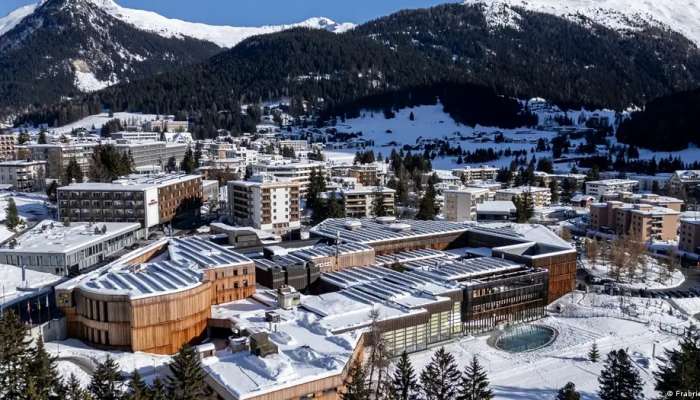
Davos: The rich and powerful of the world are descending on the idyllic Swiss resort town of Davos for the meeting of the World Economic Forum.
The annual event is taking place at a time when the world is witnessing devastating wars in Gaza and Ukraine, breakthroughs in artificial intelligence (AI) that are causing as much excitement as worry, a catastrophic debt crisis amid an economic slowdown, and a deterioration in the health of the planet.
Over 2,800 participants are slated to attend the 5-day event starting Monday, January 15, including more than 60 heads of state and government. The theme of this year's meeting of global political and business leaders, celebrities and prominent social activists is "Rebuilding Trust."
"The theme is a direct response to the erosion of trust that is evident in societies and among nations," WEF Managing Director Mirek Dusek said during a media briefing.
Some might directly link the fissures to the "deep transformations all around us, be they geopolitical, geo-economic, or those related to climate and nature," he said.
Among the top political leaders taking part are French President Emmanuel Macron, European Commission President Ursula von der Leyen and Chinese Premier Li Qiang.
Argentina's newly-elected President Javier Milei is also expected to attend.
The US would be represented by Secretary of State Antony Blinken, who would be joined by key stakeholders in the war in Gaza, including Israeli President Isaac Herzog and Qatar's prime minister Mohammed Bin Abdulrahman Al Thani, to discuss ways to put an end to the conflict in Gaza and avoid a further escalation as many are fearing.
The war in Ukraine is expected to feature prominently this year as well. President Volodymyr Zelenskyy is expected to attend the meeting in person to rally support for Ukraine as key allies the US and the EU struggle to unlock billions in crucial aid to Kyiv.
Sluggish economic growth and the persistent cost-of-living crisis amid higher interest rates are hitting people hard around the globe. The World Bank recently warned that the global economy is on its way to ending 2024 with the slowest half-decade of GDP growth in 30 years.
While global recession fears have receded thanks to robust growth in the US, there are worries that soaring geopolitical tensions could derail the recovery. A slowing China, the world's second-largest economy, has also darkened the outlook in many developing countries in Africa and Asia.
Another issue that would also dominate the agenda is the colossal levels of debt that developing economies, many of them in Africa, have piled on in recent years to deal with multiple crises such as the COVID-19 pandemic, energy shortage and climate change.
Today, 3.3 billion people live in countries that spend more on interest payments than on education or health, according to the United Nations. Many developing countries are witnessing their financial coffers come under stress amid high food and energy costs and higher borrowing costs.
The state of the economy and the debt crisis will be high on the agenda of African leaders who are expected in high numbers, led by Nigerian President Bola Ahmed Tinubu and his Kenyan counterpart William Ruto.
"When it comes to Africa, it's still about building trust in Africa as a vibrant hub of current and future opportunities, especially its demographic dividend," said Leonard Stiegeler from Africa Collective, a platform to promote African interests to global investors.
"When it comes to the future creation of jobs, future unlocking of the workforce, Africa is a place to look at and that's something African leaders would be looking to promote," he told DW.
AI a key theme
The boom in artificial intelligence, which has unleashed opportunities as well as headaches for regulators, is a major topic this year with a host of panels dedicated to the technology revolution.
An annual risks survey published by the WEF on Wednesday put AI-driven misinformation and disinformation as the biggest danger in the next two years. The survey said "nexus between falsified information and societal unrest will take center stage" this year when major economies such as the US, the EU and India go to polls.
"We would want to be positively paranoid about frontier technologies and other frontier issues," Dusek said. "And already put the fabric of public-private dialogue and cooperation around these issues so that we don't end up playing catch-up as some would say the world is doing when it comes to generative AI."